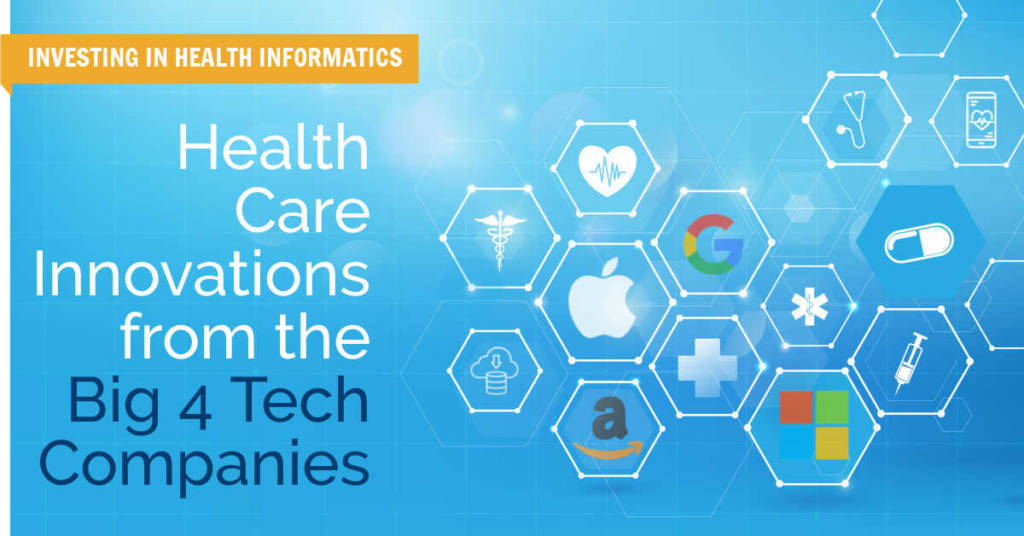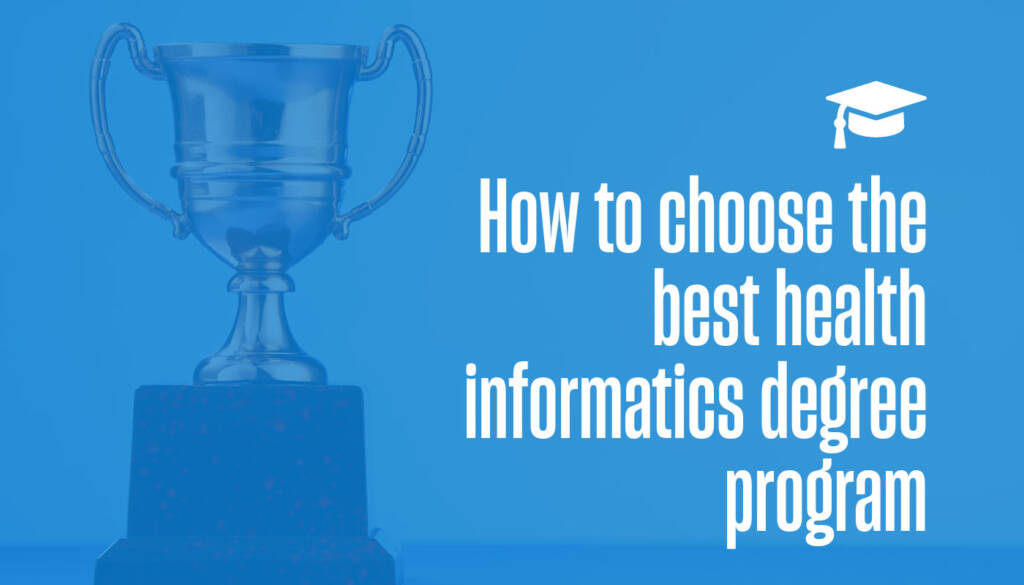The field of health care informatics is booming, with thousands of new jobs and emerging career paths for those in health technology and analytics. This health informatics employment boom is fueled by data — specifically, the nonstop torrents of valuable medical data being generated continually in today’s hyper-connected world by medical devices, patient records, insurance claims, billing departments and even wearables.
If you are considering what a career shift toward health care informatics might look like, you may also be wondering what education and experience you need to successfully make the move. As you weigh your options, make sure you explore these questions.
1. Should I Consider Getting a Master’s Degree in Health Care Informatics?
Yes. Not only will a master’s degree in health informatics help you acquire the sought-after knowledge and skills, it can set you apart from the competition at a time when health informatics professionals are in high demand and short supply.
2. What Hard and Soft Skills Can Be Gained from a Health Informatics Master’s Degree?
There are a number of skills you need to be successful in a health informatics career, largely in the technical realm. At the most basic level, a health informatics master’s degree should build your proficiency in the following areas:
- Design and management of databases
- Application of information systems to solve clinical problems
- Workflow design
- Design for the integration of human/technology systems
- Advanced leadership skills in project/technology team management
- Leadership in data and technology management
- Financial management
- Data analysis
- Data management
- Strategic planning
- Policy development
Because a master’s degree also prepares you to take on leadership and managerial roles, it is important that the program you enroll in also focuses on the development of essential soft skills, such as:
- Communication
- Conflict resolution
- Leadership
- Critical thinking
- Problem solving and decision making
3. What Are Career & Salary Expectations for Someone With a Master’s in Health Informatics?
A Healthcare IT News article reported that informatics is a top career in health care because those who master the art of combining medical knowledge with health IT skills are in a better position to demand higher salaries, enhance their potential for advancement and become an integral part of a dynamic health organization. “Clinicians with informatics skills are perfectly poised to expand their role at health care organizations that have already adopted electronic health records and are now getting ready to reap the rewards by analyzing the data from those systems,” said Joyce Sensmeier, RN-BC, MS, Senior Advisor, Informatics for HIMSS, a global organization focused on better health through information and technology. To master that art of combining patient care with IT skills, many in the field rely on formal education. And they are happy to do so knowing that their degree will translate into a higher salary.
According to the American Health Information Management Association (AHIMA) Career Map (hover to see job titles; click to see job descriptions and average compensation), the following jobs typically held by healthcare informatics master’s program graduates earn the following salaries:
- Chief Clinical Informatics Officer – $180,000
- Director of Clinical Informatics – $128,075
- Director of HIM – $90,763
[RELATED] Healthcare Informatics Jobs and Salaries: What You Need to Know >>
4. What is Better for Nurses: A Master’s in Health Informatics or a Master of Science in Nursing Informatics?
There are a number of differences between health informatics and nursing informatics, most notably in how they utilize patient and medical data to improve outcomes within their individual disciplines. While both are obviously concerned with patient care and outcomes, nursing informatics is solely focused on improving patient outcomes while health informatics also seeks to leverage data insights to improve business operations, efficiencies and overall strategies. For nurses who are looking to change careers while still maintaining some of the responsibilities of their previous role, a nursing informatics master’s degree would be a better fit.
Here is a more thorough breakdown of these two fields:
| Nursing Informatics | Health Informatics |
| Bachelor’s in Nursing (BSN) required for admission to Master of Science in Nursing Informatics (MSN in Informatics) programs; RN credentials may also be required | Bachelor’s degree required for admission to Master of Science in Health Informatics programs |
Focused on:
| Focused on:
|
Certifications:
| Certifications:
|
6. Is a Master’s in Health Informatics Better than an MHA or MPH?
These three master’s programs — master’s in public health (MPH), master’s in health administration (MHA) and master of science in health care informatics (MS-HCI or MSHI) — are all excellent choices for someone interested in health care administration. Each, however, will prepare students for very different careers.
Someone who earns an MPH degree is focused on managing community health; the degree would prepare someone for a job as an epidemiologist, health education worker or public health analyst.
For those who study health administration, their program will focus more on the business and legal issues that impact the delivery of quality health care services. Those who hold a master’s degree in this discipline will be on track to work as a hospital administrator, CEO or medical practice manager.
Finally, health informatics master’s degree programs are more technical in nature and prepare graduates to use the latest data analytics tools and technologies to gather and analyze critical health data to improve medical and operational outcomes. With a master’s degree, one could expect to eventually work as a director of health informatics, clinical informatics specialist or a chief informatics officer.
| Master’s in Public Health | Master’s in Health Administration | Master of Science in Health Informatics | |
| Intended For | Those who want to focus on the management of community health services or public, governmental and nonprofit health care agencies. | Professionals who aspire to leadership roles that require a comprehensive understanding of how business and legal issues impact the delivery of quality health care services. | Professionals who are interested in working in data modeling, health information and governance, process optimization, clinical analytics, or any of the evolving roles involved with the growing health informatics discipline, either with a health care background or without. |
| Coursework Focus Areas |
|
|
|
| Potential Career Paths for Degree Holders |
| The following job titles are common within a health care setting such as a hospital, clinic, nursing home, hospice, and other healthcare settings:
|
|
| Degree Accreditation/Approval | CEPH – Council on Education for Public Health | CAHME – Commission on the Accreditation of Healthcare Management Education | HIMSS – Healthcare Information and Management Systems Society |
7. What Employers Are Hiring Health Care Informatics Graduates Right Now?
You might assume that earning a health informatics master’s degree means working in the medical or research fields. While this is certainly true and there are many opportunities within these industries at hospitals, university research centers, medical centers and more, health informatics is such a growing discipline that many new opportunities are popping up in the tech space.
The Big 4 tech companies — Google, Apple, Amazon and Microsoft — are making large investments in the health data arms of their businesses, meaning they are actively seeking qualified health informatics professionals. “The companies,” according to the New York Times, “are accelerating their efforts to remake health care by developing or collaborating on new tools for consumers, patients, doctors, insurers and medical researchers. And they are increasingly investing in health start-ups.”
8. What Are Health Care Informatics Employers Looking For?
For many jobs in the health informatics field, a combination of advanced technology and nursing or clinical care skills are required – a combination that can be hard to come by. That’s why a graduate degree can be so beneficial for those interested in a career in health informatics.
Not only will a graduate degree help you balance out your skill set so that you are fully qualified for today’s informatics positions, but many top jobs in health informatics (Clinical Informatics Analyst, Health Informatics Consultant, Chief Medical Information Officer, Director of Clinical Informatics, etc.) prefer candidates who have at least a master’s degree.
[RELATED] How to Choose the Best Health Informatics Degree Program >>
9. Will a Master’s Degree Help Me Get Certified in Health Informatics?
While this isn’t a clear-cut answer, a good master’s in health informatics curriculum should cover most or all of the topics that you will be tested on during a health informatics certification exam. As such, earning your master’s degree in health informatics can help you get certified.
Earning a health informatics certification can be helpful depending upon where you want to work and what type of role you are looking for. Many employers rely on professional certifications as a proof of proficiency in core functional skills and knowledge. Earning one of these health informatics certifications can help you stand apart during the job search process:
- HIMSS: Certified Associate in Healthcare Information and Management Systems (CAHIMS) and Certified Professional in Healthcare Information and Management Systems (CPHIMS)
- American Nurses Credentialing Center (ANCC): Registered Nurse Board Certified (RN-BC)
- American Health Information Management Association (AHIMA): Certified Health Data Analyst (CDHA)
- American Medical Informatics Association (AMIA): Advanced Health Informatics Certification (AHIC)
10. How Can I Choose the Best Health Informatics Degree Program?
When evaluating health informatics master’s degree programs, there are a few questions to ask of yourself and of the university you might be attending. Those questions include:
- What level of education do you want?
- In what capacity within the health informatics field do you wish to work?
- How do you want to learn — online, on-campus or hybrid?
- Is the program regionally accredited?
- Who teaches the courses in the program? Do they have professional experience working in health informatics?
- Is the program a HIMSS Approved Education Partner?
11. How Long Does It Take to Complete a Master’s in Health Informatics?
There are a number of factors that will determine how long it takes you to complete a health informatics master’s program — whether you are full time or part time, if you pass each class, how much tuition you can afford, etc. On average, a master’s degree in health informatics will take you approximately two to three years to complete.
12. What Are the Requirements to Apply for a Health Informatics Master’s Degree?
First and foremost, to apply for a master’s degree you must at least hold a bachelor’s degree from a regionally accredited university. Specific requirements beyond that will likely vary depending on which program you apply to, but for example, the University of San Diego has the following requirements for its master’s in health care informatics program:
- Completion of a regionally accredited bachelor’s degree
- Basic computer and information management skills, including familiarity and experience with Microsoft Office products (Word, PowerPoint, Excel)
- Basic understanding of medical terminology (non-health care professionals are required to complete an additional medical terminology course by the end of the first term)
- One year of relevant work experience
13. What Courses Will I Take?
The exact curriculum will vary from university to university, but there are a handful of foundational courses most health informatics master’s programs require. Those include:
- Health Care Information Management
- Health Care Delivery Systems
- Health Care Data Analysis and Visualization
- Financial Management in Health Systems
- Database Design and Management
- Electronic Medical Record Systems
Then, depending on whether or not you choose a specialization within health informatics — such as health care analytics, clinical informatics, health care policy and health care leadership — you may be required to take different core courses.
14. Can I Just Get a Graduate Certificate in Health Informatics Instead of a Master’s Degree?
For the most part, employers are looking for candidates who hold a master’s degree in health informatics rather than a certificate. For people who already have a medical background or those looking to transition from an unrelated field, a master’s degree will be the most effective tool to successfully launch a career in health informatics.
While a certificate in health informatics will definitely help you develop key technical skills or give you an introduction to the field if you have no health background, it won’t provide the same career opportunities as an advanced degree. Of course, there are some circumstances that warrant a certificate, such as professionals who already hold an advanced degree in another field. To help you weigh your options, consider these differences:
A certificate program in health informatics may be right for you if: |
A master’s program in health informatics may be best for you if: |
| You want to gain some exposure to the field before deciding whether to commit to a full master’s degree program | You work as a health care professional and are focused on obtaining the necessary IT and informatics skills |
| You already have experience working in informatics and are looking for a resume boost | You work as an IT professional and are focused on obtaining the needed health-related training and medical knowledge |
| You have already acquired an MBA but need to develop technical skills specific to medical informatics | You want to go beyond learning the basic technical tools and skills, and delve into courses in leadership, finance, strategic planning, statistics, and more to position yourself for advancement in a hospital or health care setting |
| You have aspirations to work in health informatics, but not necessarily in a leadership capacity | You are willing to invest the extra time required to complete an advanced degree (your online master’s degree can be completed in less than 2 years) |




